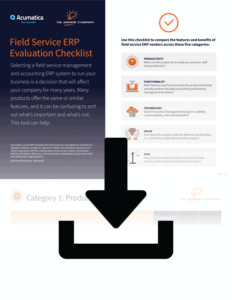
Looking into the Future of Field Service Businesses
What will the field service industry look like in 10 years? While the field service industry has been slow in adopting new field service management software, patterns show that the turn of younger generations is leading to accelerated digital transformation. The field service management industry is expected to grow to $5.1 billion USD by the year 2025 at a CAGR of 11.0%. The rise of software for field service management is driven by a demand for technology that directly addresses day-to-day field service needs.
With so many new and upcoming solutions, it’s easy to get distracted by flashy messaging and new functionalities, making it difficult to find a solution that actually fosters your business growth. Based on the Field Service ERP Evaluation Checklist (click to download), we’ll cover five primary components to consider when evaluating different ERPs for field service.
What to Search for in an ERP for Field Service
1. Productivity
Before evaluating the multitude of ERP features available, check off boxes for the solution as a whole to make sure the new technology will make your team more productive instead of complicating things with no benefit. Because all members of your organization use field service ERP, you want to ensure that the solution is user-friendly and accessible from any device, anytime and anywhere, for team members working on the road, from home, or in different geographical locations.
If you’re considering international expansion, search for a solution that supports multiple languages and currencies. Other components to boost your productivity are AI-powered workflow automation, alerts and notifications, document-sharing capabilities, and comprehensive reporting. Above all, remember that the need for your team to juggle multiple systems greatly hampers productivity, so search for a solution with pre-integrated add-ons and all-inclusive modules that cover all your management needs.
2. Functionality
Different ERP for field service can include assorted features, but all basic field service management software should have systems for scheduling, dispatching, job tracking, and invoice management. To future-proof your business, you may want to consider that modern ERPs for field service also have systems for inventory management, project management, route planning, GPS tracking, customer relationship management (CRM), and many other items. Also note that the approach to building your field service ERP solution can greatly determine the implementation costs for each feature and ease of integration between systems.
3. Technology
The foundational technology of your solution will greatly affect your team’s user experience and, consequently, productivity. Search for solutions with a responsive design, intuitive interface, and customizable dashboards and widgets. Acumatica’s clean, user-friendly interface is much lauded by industry analysts. Field service ERP platforms that are easy for everyone to navigate on any device greatly enhance efficiency.
Also consider how the flexibility of your software greatly affects your enterprise’s ability to adapt to market challenges and opportunities for expansion. The option of both on-premise and cloud deployment allows you to transition from on-premise to cloud without starting over. When your business is ready for it, a true cloud-based design will allow for ‘anytime, anywhere’ user access and up-to-minute data; this helps everyone stay on the same page, which becomes increasingly important as your organization expands its numbers. Search also for customization of industry-standard tools and easy upgrades that require little to no assistance from the ERP vendor.
4. Value
Measuring the big-picture return on investment of your field service software starts with the total cost of ownership (TCO). Consider the fees for licensing, user support, hardware, upgrades, and deployment. Apply all of these potential costs into all the integrations and add-ons that are not included in your basic solution and that you’ll need to pay for. Additionally, read the fine print for what vendor IT support and customer support actually consist of, and what level of responsiveness you can expect.
The value of a software can greatly depend on the size of your organization. Some solutions become costlier as you expand, while other solutions have a cost-scale that reasonably matches the size of your company. Search for solutions that allow you to only pay for the modules you need, and add new functions as you grow. Avoid solutions with per-user fees on top of per-resource fees, as that unfairly charges you for the growth of your team.
5. Risk
Many ERP implementations fail due to lacking compatibility between the software and the company’s needs. When evaluating ERPs for field services, search for a solution with proven benefits to field service companies by identifying vendor knowledge of the industry and any past implementations for field service businesses.
Reducing risk is also important for data security. A well-designed cloud ERP automatically saves all data on the cloud, where it is significantly less susceptible to ransomware attacks. Cloud-deployed solutions also reduce the costs for backup and data recovery, as data will always be updated and backed up to the minute.
Above all, cloud ERP for field service reduces the time and money spent on IT support and upgrades, as most updates are automated and require no on-premise action or system downtime.
The field service management industry is growing precisely because of a rise in new technology. Your search for the right solution must begin with a strong understanding of all the different types and functionalities of ERPs for field service.
Field Service ERP Evaluation Checklist
Get in touch
with one of our experts
Related Resources




